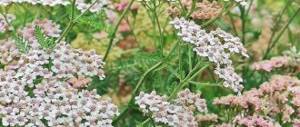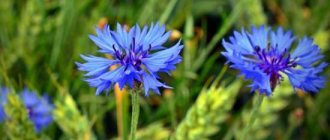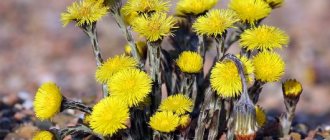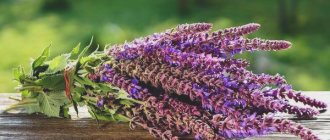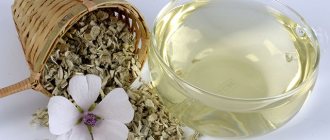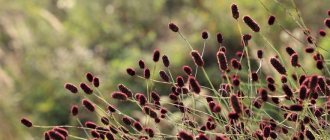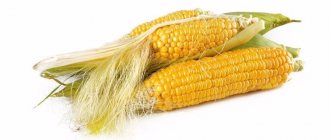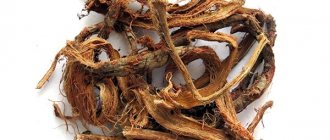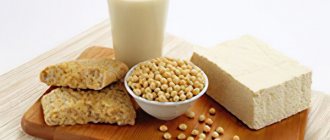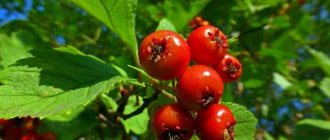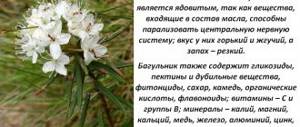Thyme
Good afternoon, my dear readers and site guests! You will learn about the healing properties and contraindications to the use of thyme or creeping thyme here.
Thyme is not a tall shrub that grows in our country and along the shores of the Mediterranean Sea. In official medicine it is also called creeping thyme. Thyme is found at the edge of the forest, in clearings and on rocky cliffs.
Creeping thyme is an excellent honey plant. In the time of our great-grandmothers, the plant was used in worship. It was added as a spice to main courses.
Thyme has also found use in perfumery. The healing qualities of thyme have been well studied for a long time. It is used to treat certain diseases.
Thyme: medicinal properties
1. The aromatic oil has an antiseptic effect, so it is used to treat inflammation. Thyme preparations are used for inhalation and gargling for sore throats and diseases of the oral cavity. These are gingivitis, tonsillitis, laryngitis, stomatitis and pharyngitis.
2. Thyme decoction is used to wash purulent wounds and ulcers. Apply lotions from the decoction to acne and boils.
3. Due to its expectorant properties, thyme decoction is used to treat bronchitis, prolonged cough and whooping cough.
4. Using its diaphoretic qualities, thyme preparations reduce high fever during inflammatory processes.
5. Creeping thyme reduces pain from radiculitis, sciatica, neuritis, trauma, stomach and intestinal colic, flatulence, gastritis and constipation.
6. Having spasmodic properties, thyme preparations reduce blood pressure, reduce headaches, and help with migraines.
7. Medicinal thyme preparations normalize the microflora of the stomach and intestines and improve appetite.
8. Effectively used for joint diseases. Baths are taken from thyme for rheumatism of the joints, arthrosis and gout.
9. In addition, thyme calms the nervous system if the patient has depression or insomnia.
Thyme: medicinal properties
Contraindications
Like every herb that has medicinal and beneficial properties, creeping thyme for oral administration has a number of contraindications:
- progressive kidney and liver diseases, ulcers, increased acidity,
- individual intolerance to components,
- children under 3 years of age.
Some pharmaceutical preparations list contraindications for children under 12 years of age. Herbalists consider this statement controversial, since thyme infusions are often used in pediatrics, but with a reduced dose and taking into account the age of the child.
Since thyme is used to treat many diseases, including cancer, it is necessary to clarify the dosage, combination with other herbs or medications with your doctor.
Thyme: beneficial properties for women
1. Inflammation in the vagina and uterus is reduced using baths and douching from a solution with thyme.
2. Douching eliminates infection in the genitourinary system and restores damaged cells.
3. The use of thyme normalizes the cyclicality of menstrual periods. During menstruation, creeping thyme reduces uterine cramps.
4. A plant with a pleasant aroma helps women endure difficult days during menopause. Reduces irritation and hot flashes.
What is thyme?
Thyme is a subshrub from the Yamnotaceae family with a fragrant aroma. The official name is creeping thyme. It is used in the treatment of various pathologies, as a seasoning in the preparation of dishes and drinks, and in cosmetics.
What does thyme look like?
Thyme is a small creeping subshrub that grows up to 30 cm in height. The stem is thin, brown in color, twisted, and woody at the base. Often, as the plant spreads, it takes root with the help of side shoots. The leaves are semi-rounded, edged with white cilia. The flowers are pink or mauve. The fruits are dry and fall into 4 nut-cones.
Where does it grow?
The shrub grows in northeast Africa, on the plains of Greenland, in Russia (in the Urals, the Caucasus, Crimea and Tatarstan). Found in the Central regions and Siberia. The plant loves open sunny areas near mountain foothills, forest clearings, and steppe zones. But you can also find them in the mountains.
Types of thyme
There are more than 200 types of thyme. The most studied are the following:
- Kholmovoy. Used in cooking and perfumery.
- Creeping. A plant with enormous medicinal potential.
- Early. This type of thyme is popular for growing as an ornamental shrub.
- Citric. An ornamental plant up to 30 cm high with shiny small rounded leaves. Exudes an unusually pleasant spicy scent.
- Ordinary. Source of medicinal raw materials.
- Faustini. A small shrub with small pinkish flowers rising above glossy rounded leaf blades.
- Mountain. The bush grows up to 15 cm. The flowers are colored deep pink. They emit a sweet smell.
- Callier. Honey plant growing in Crimea for livestock feed.
- Kochi. Used as medicine and spice.
There are varieties of thyme that are threatened with extinction. This is Marshall and Taliev's thyme.
Thyme: application
1. Climax. Mix together 3 large spoons of raw materials with 4 large spoons of lemon balm. Brew a small spoonful of herbal tea with a glass of boiling water and leave for half an hour.
You need to drink a couple of glasses a day for 7 days. Treatment is repeated after a month.
2. To reduce pain during menstruation. Tea can help women reduce pain. To prepare tea, mix thyme and chamomile in equal parts. 1 large spoon of the mixture is steamed with 250 ml of boiling water and left for about 10 minutes. The tea is filtered and consumed before bed.
3. For the treatment of joints, radiculitis and gout. To reduce pain, poultices are applied to the affected areas of the skin. To do this, thyme is steamed with boiling water for two minutes and used as a compress.
4. In stressful situations, it is necessary to strengthen the nervous system with thyme infusion. To prepare a healing drink, five grams. crushed thyme powder is brewed with half a liter of boiling water. The container is tightly sealed, and it is recommended to leave for more than 40 minutes. Consume per day. Treatment should be carried out no more than three times a week.
5. To treat pulmonary diseases, diseases of the organ of hearing, nose and throat, drink tea with thyme. To prepare it, steam a dessert spoon of flowers with a glass of hot water and leave for 10 minutes. Then the broth is filtered, enriched with a spoon of honey and consumed as tea.
This remedy strengthens the immune system, increases libido and quenches thirst. In the cold season, it warms the body after a walk. However, you don't need to drink it often. This tea has a negative effect on the thyroid gland.
6. From flatulence. An infusion of thyme will help solve such a delicate problem if you drink it before meals at least 4 times a day, half a glass. The infusion relieves intestinal spasms and reduces gas formation.
7. Getting rid of the smell of sweat. A person is uncomfortable when he smells of sweat. The cause of the unpleasant odor is a lack of zinc in the body. Creeping thyme preparations can help him because they have an antibacterial effect. You need to wash your face with thyme infusion every morning to make the problem disappear.
Calorie content and chemical composition
The calorie content of fresh thyme is 101 kcal per 100 g of herb. BJU ratio: 5.56; 1.68; 24.5g. The plant is rich in phosphorus, potassium, iron, magnesium, B vitamins, and ascorbic acid. Contains phenolic derivatives of terpenes, tannins, bitterness, acids, flavonoids.
Medicinal properties and contraindications of thyme
The plant is valued as a medicinal raw material due to its therapeutic properties. The benefits of thyme are due to acids of organic origin:
- Ursolova - improves muscle tone and metabolic processes in the body.
- Caffeic acid - increases vitality, fights depression, fatigue and blues.
- Vitamin C - increases the body's defenses.
- Flavonoids increase the strength of vascular walls.
The active component of thyme is thymol, which has pronounced antibacterial properties. But if the dosage is exceeded, it provokes hyperfunction of the thyroid gland. In people with diseases of this organ, thyme can provoke an exacerbation.
Useful and healing properties of thyme
All components of thyme enhance each other’s effect, so the plant has a complex effect. Medicines containing it relieve pain in the abdomen and help cure headaches. The infusion is useful for bloating, loss of appetite, and helminthic infestations.
Tea with thyme removes toxins, helps to relax, relieve anxiety, irritability, and improve the functioning of the nervous system. Improves blood supply to the pelvic organs, therefore useful for painful menstruation in women and sexual weakness in men.
Baths with thyme are taken for inflammatory skin diseases. It cleanses the skin of pustules and relieves itching due to dermatitis. For a bath, prepare a strong decoction of herbs with flowers, pour boiling water over them and then simmer in a water bath for about 20 minutes. The decoction is filtered and poured into the bath. The treatment procedure lasts 25 minutes.
Dangerous properties and contraindications
Products with thyme are contraindicated for kidney problems, liver diseases, severe heart pathologies, and thyroid dysfunction.
Pregnant women should not consume this herb due to its ability to tone the body. It can cause uterine hypertonicity, which can lead to premature birth. Thyme can cause complicated allergies in people intolerant to its components.
Thyme decoction for alcoholism
To combat alcoholism. Can be used without the man's permission. Often the husband or son does not consider himself sick and does not want to be treated. Thanks to its pleasant smell, it can be used to flavor first and second courses.
When a person gets used to the smell and taste of the powder, the dose should be increased to the daily dose of 1 dessert spoon. The benefits will be no less than using a decoction.
If the drinker agrees to treatment for alcohol addiction, then a decoction of thyme can help him.
To prepare the decoction, brew 2 large spoons of raw materials with a glass of boiling water and leave for more than 2 hours. The decoction is drunk throughout the day. The remedy reduces cravings for alcohol. If you drink it at once, you will feel nauseated.
What is thyme used for?
Bogorodskaya grass (creeping and other types) is the main component of many medications that help with colds. This plant is also effective as an ointment for external use for swelling on the body and insect bites. It can be safely used in the absence of contraindications, either together with other ingredients or in its pure form. In the latter case, creeping thyme, which has amazing medicinal properties, will be indispensable for conditions such as:
- depression and fatigue;
- muscular rheumatism and skin rash;
- colds;
- concussion and other brain injuries;
- not a very pleasant smell in the mouth;
- impaired digestion - the herb is used as an astringent;
- diseases of the urinary system - inflammation of the bladder (cystitis), pyelonephritis (damage to the tubular system of the kidneys), the presence of stones and sand in these organs;
- prostatitis, male impotence and infertility;
- active mental activity;
- painkiller for women's diseases;
- for pneumonia, asthma, tuberculosis and catarrh of the upper respiratory tract;
- for radiculitis, rheumatism, neuralgia, actinomycosis (formation of granulomatous lesions in human organs and tissues).
Thyme for hair
To strengthen hair. To prepare a useful product, thyme leaves and flowers are placed in a container without compacting. The raw materials need to be filled with purified sunflower oil. You need to insist for more than a month.
Sunflower oil is sometimes replaced with olive or corn oil. The product is filtered and used as a mask. Instead of fresh raw materials, you can use dry ones. Then the oil is kept in a water bath for 1 hour.
To use, 1 drop of thyme oil is mixed with 5 drops of another vegetable oil and only then the resulting mixture is applied to the scalp. This way reduces hair loss. They acquire shine and silkiness.
Helpful information
Although thyme oil is not as popular among cosmetologists as pumpkin seed oil, it is used:
- In the care of thinning, weakened, split hair. It is especially effective for restoring hair structure after perm, as well as during recovery after long-term illnesses.
- For complex therapy in the fight against acne and acne.
- Includes lotions and creams for the care of normal, oily and problem skin.
- Contains salts and bath foam.
- To strengthen and restore nail structure.
- For anti-cellulite massage (as a warming component).
- Baths with a decoction or a few drops of oil are an excellent and affordable way to improve the condition of the skin and lift your mood.
Other uses of thyme are also known:
- It is actively used in perfumery as a fragrant additive in eau de toilette, perfume, cosmetic soap, and cosmetics.
- In cooking, the leaves are added to marinade for preserving vegetables, berries, and compotes. Whole leaves and flowers are added to teas and cocktails, and homemade alcoholic drinks are infused with them. The oil is used to flavor dishes.
- Thyme has long been endowed with mystical properties and was revered in Orthodoxy. It was called Bogorodets grass because on the feast of the Dormition of the Holy Mother of God, icons were decorated with its flowering branches. Some churches used the aromatic herb instead of incense during worship. It was believed that the herb not only cures all ailments, but also protects against evil spirits.
Thyme decoction for cough
Cough syrup. The syrup is easy to make at home. To prepare the medicine, take several thyme plants, wash and grind them. When the raw material dries, it is steamed with 450 ml. water and simmer over low heat until the water is reduced by half.
The composition is cooled, filtered and enriched with garlic juice squeezed from 50 grams. vegetable. The product is also saturated with 300 g. honey. Store on the refrigerator door for 6 months.
Used for treatment in a small spoon twice a day for the treatment of colds, for better sputum discharge, for ENT diseases. But, if the syrup is prepared for children, then garlic juice should not be added.
Thyme in the pharmacy
Thyme properties. Preparation and storage
For medicinal purposes, it is recommended to use only the above-ground part of thyme. The grass is collected at the time when it begins to bloom. You should go “hunting” for thyme in dry weather, after the morning dew has disappeared. You should only cut off the top shoots with flowers, and not pull out the entire plant by the roots.
In order for thyme to retain its healing properties, it must be dried properly. It is recommended to do this in natural conditions - that is, in the shade, under canopies, spread out on natural fabric or paper. In order for the grass to dry properly, it is recommended to lay it out in a layer, the thickness of which should not exceed five centimeters. You can also dry thyme in a suspended state, tying it into small bunches.
But dryers should not be used for harvesting thyme. The thing is that with accelerated drying, the essential oils present in the thyme will evaporate. If you still decide to use a dryer, then the air temperature in the chamber should not exceed 35 degrees.
Thyme should be dried until its branches become brittle and the flowers begin to fall off. After this, the dried grass should be threshed and all foreign impurities, spoiled leaves, and too coarse stems should be removed. Ready-to-use medicinal raw materials should be a mixture of inflorescences and leaves.
Store dried thyme in a place protected from direct sunlight with good ventilation. It is recommended to use fabric or paper bags, cardboard boxes or glass jars as containers. But it’s better to forget about plastic bags - your supplies in them will quickly become damp, completely losing their beneficial properties.
If stored properly, the shelf life of dry thyme will be about two years.
Thyme: contraindications
Thyme preparations help in the treatment of many diseases, but there are also contraindications:
1. Allergy sufferers do not need to use them, because thyme contains essential oil.
2. People with cardiovascular diseases should avoid thyme. It causes a rapid heartbeat and increases blood pressure.
3. Thyme should be used with caution by diabetics, patients with impaired internal secretion, and patients with liver and kidney disease.
4. In case of exacerbation of gastritis, stomach ulcers, the use of medicinal plant preparations should be temporarily stopped.
5. Pregnant women need to use thyme preparations only with the permission of a gynecologist.
6. There is no need to get too carried away with thyme treatment. You need to consult a certified specialist.
Savory: use in cooking
The plant is an excellent remedy for increasing appetite. In addition to healthy tea, soups and salads are prepared from it. Savory seasoning in cooking goes well with meat dishes. You can add either fresh or dried kondari.
Foliage, buds and young shoots are used. Because saturate has a bright, pungent taste and smell, it can overpower the taste of other ingredients. It is added to dishes quite a bit and always at the end. Excessive heat treatment weakens the medicinal properties of the bush. Cooking also uses lemon savory. If there is at least one contraindication, then it is undesirable to use the seasoning.
Thyme in cosmetology
Thyme-based products are used for skin and hair care. In cosmetology, decoctions, infusions and thyme oil are used.
Thyme tightens sagging skin, tightens pores and eliminates puffiness. Face masks and lotions are made from the plant.
For hair care at home, prepare rinsing solutions and hair masks. Thyme infusion is added to shampoos and balms. Let us tell you why thyme is used in cosmetology.
Facial compress
Thyme-based products have an anti-inflammatory and soothing effect on the skin. With regular cosmetic procedures, they normalize the metabolic processes of skin cells, reduce oiliness and swelling.
Ingredients:
- Thyme - 1 tablespoon.
- Water - 200 ml.
How to cook : Pour a glass of boiling water over the thyme, cover with a lid and let steep for 30 minutes.
How to use : Soak a fabric base for masks or a gauze napkin in the resulting infusion, squeeze it out and apply it to your face. Wet the cloth every 5 minutes. The duration of the procedure is 20 minutes.
Result : The compress tightens pores, tones the skin and removes excess fluid.
Hair rinses
A decoction of the plant is used to rinse hair. It nourishes and strengthens curls, eliminates split ends. With regular use, it eliminates dandruff.
Ingredients:
- Thyme - 5 gr.
- Nettle - 5 gr.
- Hop cones - 5 gr.
- Birch leaf - 5 gr.
- Water - 1 liter.
How to prepare : Pour water over the dry herbs, place in a water bath and bring to a boil. Cook for 15 minutes, then remove from heat, cover and leave for 30 minutes.
How to use : Wash your hair with regular shampoo and rinse your hair with the resulting decoction. Repeat the procedure 2 times a week.
Result : The product strengthens hair follicles, prevents baldness and makes curls more manageable and silky.
Thyme for pregnant women
For pregnant women, the use of tea and thyme decoctions is absolutely not contraindicated, because these remedies calm the nervous system and improve mood. Herbal tea will help eliminate spasms of the gastrointestinal tract and save you from diarrhea. But, still, before you start using thyme-based drugs, you need to consult with your doctor. Moreover, chaotic, increased consumption of herbal remedies should be limited, as this can only cause harm.
Thyme for men: benefits and harm
Previously, healers used herbs to treat various ailments, so essential oils were more often used. It is found in thyme and is often used to relieve spasms and pain. Its separate property is its use for potency, so this is worth mentioning separately.
Thyme for potency
Decoctions based on thyme are drunk to correct erectile dysfunction. The herbs contain microelements - selenium and molybdenum, which have a positive effect on testosterone production and sperm quality. For prevention and treatment, take the following solution:
- 0.5 liters of boiling water is poured into the bowl.
- Pour 2 tablespoons of thyme into it.
- Infuse the solution for several hours.
- Then it is filtered.
To increase sexual activity, make a compress and rub some of the residue into the perineum. You can also use oil. The crushed herb in the amount of 15 g is poured with olive oil, after which it is left for one and a half months. This remedy is perfect for combating early ejaculation.
To treat prostatitis, drink thyme tea. The tea contains zinc, which affects reproductive function in men. Tea is also useful for colds and muscle inflammation - myositis. Nerve fibers are affected, which can cause muscles to atrophy. Therefore, timely help can save you from complications.
Thyme for alcoholism
The only problem in curing a man of alcoholism is his reluctance to become normal, otherwise he could be admitted to a hospital for treatment. Therefore, today we will consider the question of how to quietly, without the knowledge of the patient, prepare a healing drink.
Thyme is useful for alcoholism
The biological name of thyme is creeping thyme, and it is added to alcohol. Thanks to its bright aroma and essential oils, it can repel a person from the desire to drink. Thyme juice contains niacin, folic acid, vitamins B, A and C, phenolic compounds - thymol, carvacrol. In case of an overdose, nausea and vomiting occur. The effect of thymol is faster if you add it to alcohol. To cause disgust from the drink, you should add thyme to a glass of alcohol and repeat the procedure every day until the desire to drink disappears.
The only difficulty is that the patient does not drink anywhere except at home, and nothing else that does not contain thyme. Otherwise, it is not difficult to guess that it is the “joy” of home that is saturated with something.
Harm and contraindications of thyme
Thyme is not harmful when consumed in moderation.
Contraindications:
- allergy to thyme or oregano;
- ovarian cancer, uterine cancer, uterine fibroids or endometriosis - the plant can act as an estrogen and worsen the disease;
- bleeding disorders;
- 2 weeks or less before surgery.
If consumed excessively, side effects may occur - dizziness, gastrointestinal upset and headache. This is all the harm of thyme.18

